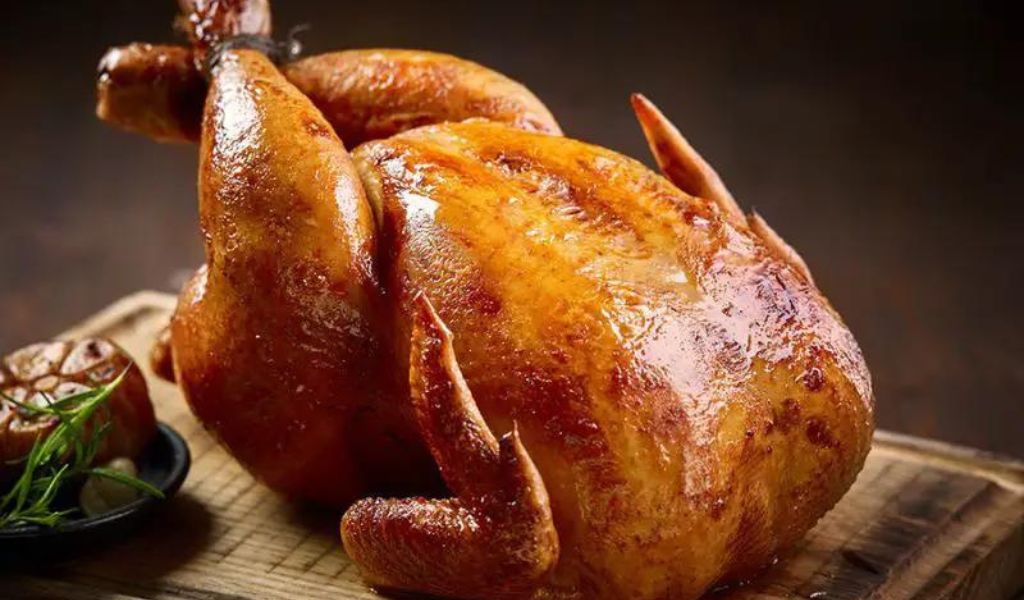First, don’t panic. While it may seem like a lot of food for your dog to consume, they will most likely be fine. Just make sure they have plenty of water available to them so they don’t get dehydrated. The biggest risk is from the bones which are often sharp and could cause internal damage. If your dog starts to vomit or appears unwell you need to get him to vet straightaway.
Dogs will take their chances with almost any type of food but there is one food that is almost irresistable to them: chicken and, if they get the chance, they will easily eat the whole bird.
Find out what to do if your dog eats a whole rotisserie chicken, there are a few things you should know about.
Dog Eats Rotisserie Chicken: What To Do
Discover the risks of dogs consuming whole rotisserie chickens, including dangers of cooked chicken bones, high fat content, toxic seasonings, and more. Learn preventative measures and essential steps to take if this happens.
Can a dog eat an entire chicken safely?
Yes, a dog can eat an entire chicken safely but it’s not something that should be done on a regular basis.
This type of poultry is high in fat and calories which can lead to weight gain and other health problems if your dog consumes too much of it.
It’s also important to make sure the meat is cooked properly before feeding it to your dog as raw chicken can contain harmful bacteria.
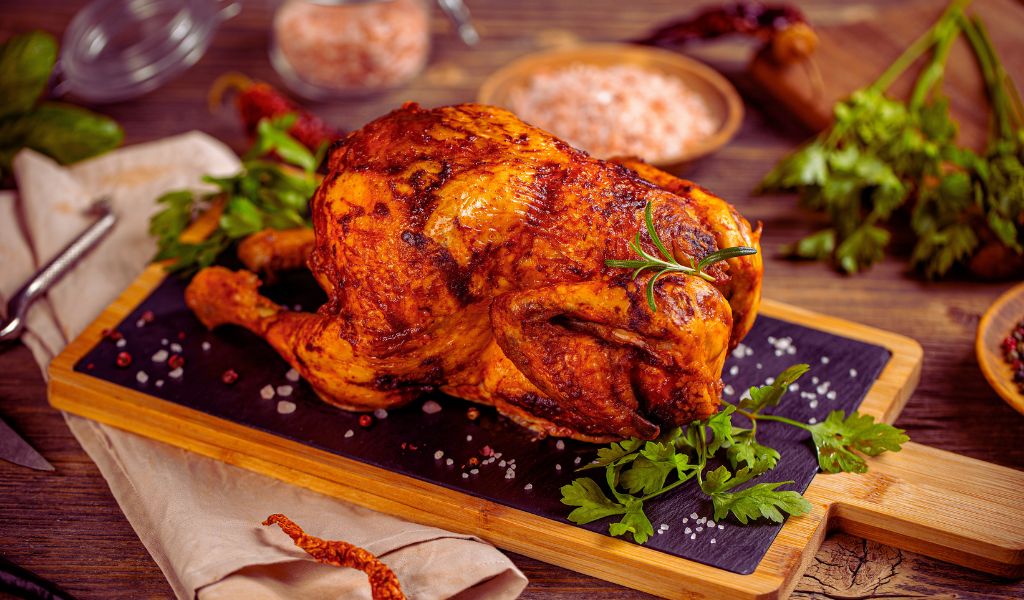
What about the bones?
It’s important to be cautious with dogs and cooked bones.
Cooked bones, particularly those from poultry, can be very dangerous for pets.
When cooked, poultry bones become brittle and can easily splinter.
These splinters can cause serious harm if ingested, such as choking, internal injuries, and blockages in the digestive tract.
It’s always better to avoid giving your dog cooked bones of any kind.
Instead, you can offer them bones specifically prepared for dogs or other safe chew toys that won’t splinter or cause harm.
If you’re ever in doubt about what’s safe for your dog to eat, it’s best to consult with your veterinarian.
They can provide guidance based on your dog’s specific health needs and dietary requirements.
Should I be worried if he ate the chicken bones?
As mentioned before, the biggest risk is from the bones.
They can splinter and cause internal damage so it’s important to keep an eye on your pet for any signs of distress.
If your he starts to vomit or has diarrhoea, takes a sudden interest in his back end or seems generally unwell then you need to get him to the vet as soon as possible.
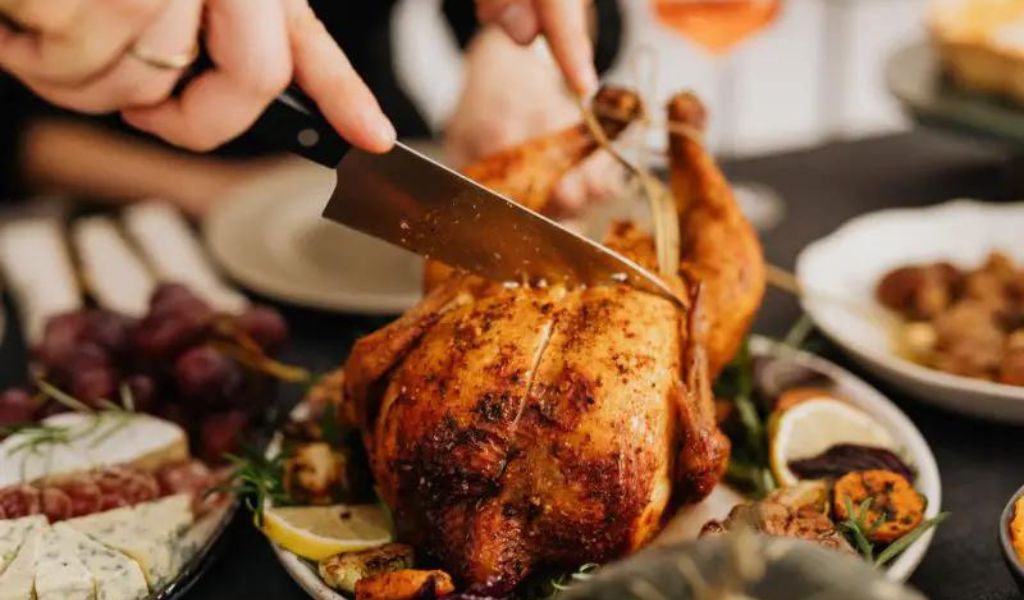
Should I make my dog vomit after eating chicken bones?
No, you shouldn’t induce vomiting.
This could actually cause more damage as the bones could become lodged in his throat or gut.
If you’re concerned that your pet has eaten the bones then the best thing to do is to call your vet for advice.
Should I give my dog bread if he eats chicken bones?
There is an old wives’ tale that says you should feed bread if your pet eats cooked bones but this is not true.
In fact, giving your dog bread could actually make the situation worse as it could cause the bones to swell and block his digestive tract.
What should I do if my dog eats the bones?
If your dog has eaten chicken bones then the best thing to do is to call your vet for advice.
They will be able to assess your dog and give you the best course of action.
In some cases, they may recommend bringing your dog in for x-rays to check for any blockages or damage.
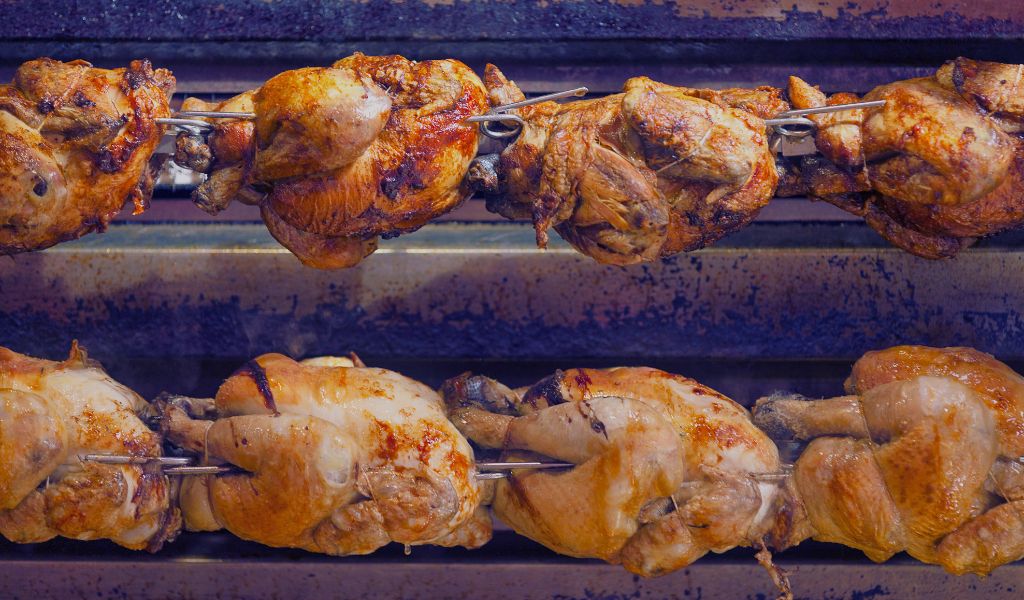
How long would a chicken bone take to digest?
It can take anywhere from 24 to 48 hours for them to digest.
However, if your dog is showing any signs of discomfort or appears unwell then you should take him to the vet straightaway.
How can I stop my dog from eating an entire chicken?
The best way to stop your dog from doing this is to make sure they don’t have access to it in the first place.
If you’re cooking a chicken, keep it out of reach of your dog and dispose of the bones properly.
If you’re eating this food yourself, don’t leave any scraps lying around where your dog can get to them.
Is it dangerous if a dog eats a whole chicken?
Yes, it can be dangerous.
Here are some key concerns:
Bones: Cooked bones can be very hazardous. They can splinter and cause choking or serious damage to your pet’s mouth, throat, or intestines.
Seasonings and Spices: Many cooked chickens are prepared with garlic, onions, and other seasonings that are toxic to canines.
Ingestion of these can lead to gastrointestinal upset or more serious health issues.
High Fat Content: Spit roast chickens, such as these, are often high in fat, which can lead to pancreatitis in canines, a serious and potentially life-threatening condition.
Size and Portion: Eating a large amount of food at once, especially something rich like this, can cause gastrointestinal upset, including vomiting and diarrhoea.
In some cases, it can lead to more severe conditions like gastric torsion or bloat, particularly in larger breeds.
If your dog has eaten a whole rotisserie chicken, it’s recommended to monitor them closely for signs of distress like vomiting, diarrhoea, lethargy, abdominal pain, or difficulty breathing, and contact your veterinarian immediately for advice.
They might suggest bringing your dog in for an examination, especially if there are any concerning symptoms.
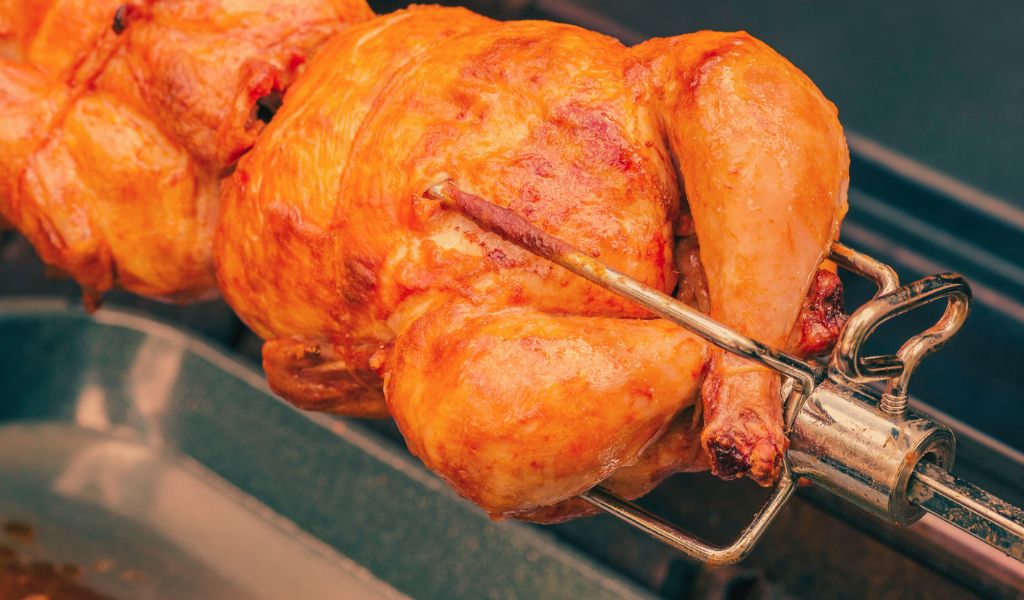
At a glance – What to do if your dog eats a whole rotisserie chicken
| Situation | Immediate Action | Follow-Up | Preventive Measures |
|---|---|---|---|
| Bone Ingestion | Monitor for choking or distress; avoid inducing vomiting unless advised by a vet. | Consult a veterinarian, especially if signs of distress or discomfort appear. | Keep food out of reach and properly dispose of bones. |
| Overeating | Monitor for signs of bloating or discomfort. | Ensure access to plenty of water; monitor for signs of pancreatitis or gastrointestinal blockage. | Supervise eating and portion meals to prevent overeating. |
| Seasoning Toxicity | Identify any toxic ingredients (like onions, garlic) that might be included. | Contact a vet, especially if toxic ingredients were present. | Avoid feeding dogs human food with unknown ingredients. |
| Gastrointestinal Upset | Watch for symptoms like vomiting, diarrhoea, or loss of appetite. | Provide a bland diet if advised by a vet and monitor for further symptoms. | Introduce new foods gradually and in small quantities. |
| Allergic Reaction | Observe for any unusual behaviour or physical reactions. | Seek veterinary attention if you suspect an allergic reaction. | Be aware of your dog’s dietary sensitivities and avoid problematic foods. |
FAQs
My dog just ate a whole rotisserie chicken, including the bones. What should I do?
If your dog eats a whole rotisserie chicken then contact your local veterinarian or an emergency animal hospital.
Consumption of cooked bones poses serious risks to dogs because they can splinter inside the dog’s digestive tract, causing injuries or blockages.
If your vet is available, they will likely advise you on the best course of action. This might involve observing your dog for signs of distress, such as vomiting, diarrhoea, loss of appetite, or difficulty defecating, or it might involve bringing your dog in for an examination.
What are the potential health risks for my dog if it ate this, including the bones?
The primary risks are from the cooked bones, which can splinter and cause internal injuries or blockages. Additionally, if your dog has consumed the skin and fat, it may lead to a sudden increase in the intake of fatty food, which can trigger pancreatitis – an inflammation of the pancreas.
Overconsumption can also lead to gastrointestinal upset due to an imbalance in your dog’s regular diet.
Can I induce vomiting in my dog after it has eaten a whole rotisserie chicken?
You should not induce vomiting without explicit instructions from a veterinarian.
Vomiting can cause the bones to become lodged in the esophagus, potentially causing choking or other injuries.
It’s essential to contact a vet immediately if your dog has ingested a chicken, as they can provide the best advice for your dog’s particular situation.
Final Words – What to do if your dog eats a whole rotisserie chicken
If your dog happens to eat your roast bird, don’t panic.
While it’s not something that should be done on a regular basis, your dog will most likely be fine.
Just make sure they have plenty of water available and keep an eye out for any signs of distress. If your dog starts to vomit or appears unwell, call your vet straightaway.

